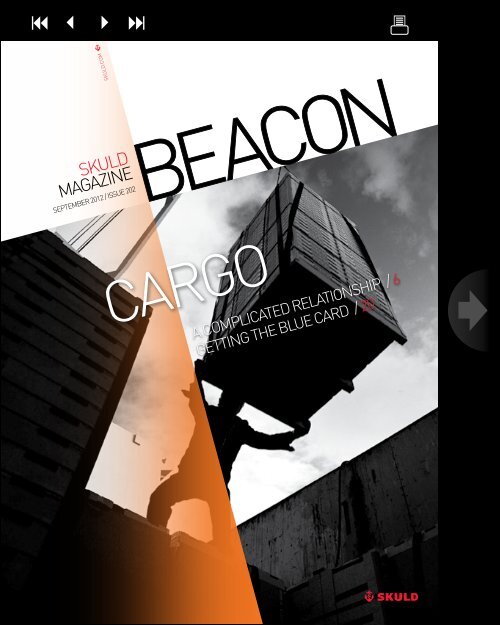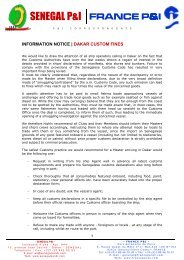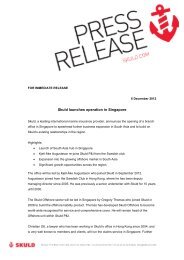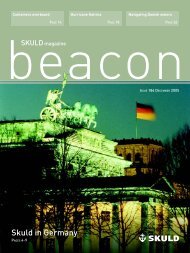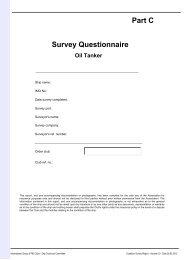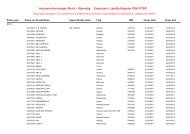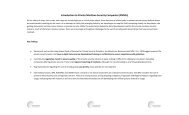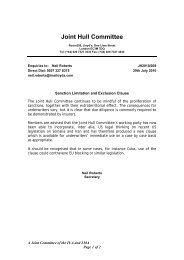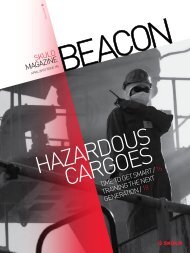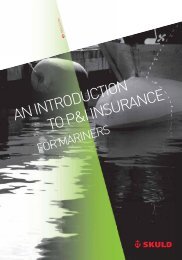Flip book - Skuld
Flip book - Skuld
Flip book - Skuld
- No tags were found...
Create successful ePaper yourself
Turn your PDF publications into a flip-book with our unique Google optimized e-Paper software.
NEwS featureCargoWritten by LEGALName Surname NEWS feature ISSUESCargoJob title, <strong>Skuld</strong>name.surname@skuld.com/article introheadingIntro textText“quote fromtext”CARGOOver eight billion tons of seaborne cargo cross the oceans everyyear 1) . It’s a staggering amount of goods carried by a staggeringnumber of vessels covering the whole spectrum of the world’sindustries. Each load has its peculiarities, each region its laws.In this feature, we study aspects of this trade and offer adviceon what to look out for when shipping that next cargo.read morewww.address.com1) In 2010, 8.4 billion tons were loaded on seaborne transport globally. Review of Maritime Transport 2011. Report by UNCTAD secretariat.Photo: 1-images.nobeacon / september 2012 5
NEWS featureCargo/By Christian OttVice President Claims, <strong>Skuld</strong>christian.ott@skuld.comPhoto: 1-images.noCarrying ilmenite sandKnow your cargoand your ship!In these difficult times, when regular cargoes are hard to find, it istempting to carry unfamiliar shipments and accept equally unfamiliarrisks. In these cases, it is important to learn about the cargo in advance,the place of origin and to ensure the vessel is suitable for its carriage.In a recent <strong>Skuld</strong> case, the crew was ableto fully mix the contaminated part of thecargo into the good cargo, and the claimwas lowered from the volume of the firstfoot to zero.Ilmenite sandA good example of an unusualcargo is ilmenite sand. This almostblackmineral is used, amongother things, for titanium extractionin paint production. The sand canbe found, for instance, in Africaand along the coasts of India,Australia and Malaysia.Ilmenite sand is very heavy, witha stowage factor of 0.36 m 3 /tonne(13 cu. ft to the ton), which meansproper trim is very important toensure vessel tank-top strengthis not exceeded.This gives rise to two considerations:(a) Does the vessel have asufficiently strong tank top?(b) Is the vessel and/or loadingport sufficiently equipped toensure proper trim?These points can be easily overlookedduring the rush of fixturenegotiation. Making sure that thevessel is fit for the intended voyageis key to ensuring successfultrading. If the vessel has weaktank-top strength and/or extratrim is required, but which localfacilities are unable to provide,then anticipated profits can quicklymelt away in a heated disputewhere a substantial settlement isclaimed for tank-top damage,additional loading costs andtime lost waiting for trimmingequipment to come into port.This is only exacerbated if the vesselis part- or fully-laden and suddenlyfinds itself in a state of unseaworthytrim and unable to sail.Liquefaction riskAlthough the cargo is particularlyheavy, it can come in fine-particlecondition where it can retain a lotof moisture. If it is laden in acountry prone to heavy monsoonrain or where transport andstorage facilities are basic, thenconcerns arise over cargo moisturecontent when loading. The clubhas provided advice before oncargoes, such as nickel ore, ironore and fluorspar, and recommendsthat vessel masters are fullyadvised of cargo liquefactionrisks prior to loading, whichshould always follow IMSBC andSOLAS regulations. If there areever any concerns, contact <strong>Skuld</strong>without delay.Sources: “Thomas on Stowage”and Nico Zurcher of HannafordForensic Services.Madagascar is one of the countries where ilmenite sand is found. Photo shows ilmeniterock sands in Fort Dauphin.Photo: Science Photo Librarybeacon / september 2012 11
NEWS featureCargoNEWS featureCargoBy Chester D. HooperOf Counsel, Holland & Knight, LLPchester.hooper@hklaw.com/Ratification of the Rotterdam Rules and their implicationsfor international shippingRotterdam Rules“It is indeed good news that the State Department ‘hopes’ to finish theratification package this summer. We have an Italian proverb that says‘if they are roses, they will blossom’. The package would indeed bea splendid blossom, that would trigger similar actions in many othercountries, that have adopted a ‘wait and see’ attitude vis-à-vis theRotterdam Rules.”Francesco Berlingieri, Studio Legale Berlingieri andpast president of Comité Maritime InternationalThe Rotterdam Rules will modernize current cargo-liability regimes through meeting modern transport needs, facilitating e-commerce,and bringing uniformity to the law.The ‘wait and see’ attitude to theUnited Nations Convention onContracts for the InternationalCarriage of Goods Wholly or Partlyby Sea (the Rotterdam Rules) caneasily be traced to the realizationthat the maritime world does notneed another treaty not ratified bythe United States. Although UnitedStates ratification is likely, itscomplicated process is slow. TheU.S. Constitution provides that thePresident may ratify a treaty onbehalf of the United States oncethe U.S. Senate has given itsPhoto: 1-images.noadvice and consent. The U.S.Department of State has beenvery mindful, even before theUNCITRAL drafting process began,of the need for industry support toobtain the Senate’s advice andconsent in the form of the requiredtwo-thirds vote (67 senators).Since the signing ceremony atRotterdam in September 2009, theDepartment of State has beenpreparing a ‘ratification package’,which it plans to complete in thenext few months before sending itto the President for approval. It isanticipated that the President willsend the ratification package tothe Senate and ask for its adviceand consent. Once received, hemay ratify the treaty and have theinstrument of ratification depositedwith the United Nations. Othernations waiting for U.S. ratificationwill likely ratify soon after theUnited States, and the RotterdamRules will go into force one yearafter the twentieth nation depositsits ratification. The RotterdamRules will modernize currentcargo-liability regimes by meetingthe needs of modern transportsystems, facilitate e-commerce,and bring uniformity to thisimportant area of internationaltransport law.The U.S. maritime and multimodalindustries played a major role indrafting the Rotterdam Rules andare satisfied with the convention.Service contracts are particularlyimportant in U.S. maritimecommerce and are provided for inthe Rotterdam Rules as volumecontracts. The service contract hasbrought the freedom of contractnow enjoyed by parties to charterpartiesto the non-liability portionsof contracts for carriage of goodsin the liner trades. The ShippingAct of 1984 and the Ocean ShippingReform Act of 1998 increased thepopularity of service contracts sothat they are now used for morethan 80% of containerized cargo toand from the U.S. The RotterdamRules apply to volume (service)contracts with its terms acting asthe default terms of the contracts.While parties to volume contractswanted the Rotterdam Rules toapply to volume contracts, theywanted to be able to derogate to acertain extent from the RotterdamRules to increase or decreasecarriers’ liability. The RotterdamThe service contract has brought the freedom of contract to the non-liability portions ofcontracts for carriage of goods in the liner trades.“The U.S. maritimeand multimodalindustries playeda major role indrafting theRotterdam Rulesand are satisfiedwith theConvention.”Photo: 1-images.no14 beacon / September 2012beacon / september 2012 15
NEWS featureNEWS feature/ CargoCargo /By Binoy Kumar DubeyClaims Executive, <strong>Skuld</strong>binoy.dubey@skuld.comProject cargoCan you handle it?<strong>Skuld</strong> has experienced a series of cargo claims caused by bad stowageand improper securing of project cargoes. A recent case involving aconsignment of heat exchangers shipped from the Far East to theMiddle East is a good example.The transport units were stacked vertically three high, with each stackholding six heat exchangers. To form each unit, two heat exchangers,each weighing about 11 MT, were secured to one another with threeseparate H-girder support structures, one fitted near each end andone in the mid-section. Each support structure comprised two verticaland two transverse girders, bolted together to form a ‘box’ around theunit’s circumference. The support structures were not secured to the heatexchangers, and the heat exchangers were not secured to each other.Photo: Monty RakusenRules allow this flexibility undercertain listed conditions.Industry also supports the doorto-doorscope of the RotterdamRules. This aspect means one lawgoverns the contracting carrier’sliability through the entire multimodalcarriage. The location ofthe cause of loss or damage willno longer have to be determinedto establish the law that governs.The application of the same law tothe carrier and to the maritimeperforming parties would removethe current incentive for cargointerests to sue stevedores andterminal operators directly in tortto avoid the carrier’s defenses andlimitations. Local tort law nowprovides a direct cause of actionby cargo interests against astevedore, terminal operator, andother parties. Courts have alloweda carrier to extend the defenses ina contract of carriage to its agents,such as terminal operators orstevedores, through a properlywordedHimalaya clause draftedto protect the party that needsprotection. The Rotterdam Rulesprovide by statute the carrier’sdefenses and limitations to maritimeperforming parties, such asstevedores and terminal operators.The Rotterdam Rules will alsoallow cargo interests a widerchoice of forums for suing thecarrier than for suing the maritimeperforming party.We hope that we see some progressin the U.S. ratification process thisyear, followed by ratifications byother nations and uniformity ofthe law governing the carriage ofgoods wholly or partly by sea.The Rotterdam Rules provide by statutethe carrier’s defenses and limitationsto maritime performing parties, such asstevedores and terminal operators.1) Of Counsel, Holland & Knight, LLP, Hobart College, B.A, Albany LawSchool of Union University, J.D., past president, The Maritime Law Associationof the United States, member of the U.S. Delegation to the United NationsCommission on International Trade Law (UNCITRAL) Working Group III onTransport Law, which drafted the United Nations Convention on Contractsfor the International Carriage of Goods Wholly or Partly by Sea (RotterdamRules). The views expressed in the article are the views of the author, notnecessarily the views of the United States or The Maritime Law Associationof the United States.The author wishes to thank Vincent J. Foley and Marie E. Larsen of Holland& Knight LLP, and Scott A. Moore for their valuable assistance.read morewww.skuld.com/BeaconAlthough the heat exchangers were stencilled with ‘DO NOT USEFORKLIFT’ on their outer shells, clearly indicating their fragile nature,charterers declared cargo as ‘fully stackable’.Inevitable damageAt the discharge port, some heat exchangers, especially those stowedat the bottom of the hold, were found damaged and a USD 1.3 millionclaim made.Under the vessel’s motion, support-structure crossbars (those that sitacross the units) dug into the frames of the heat exchangers below.The crossbars twisted and the top surface of the side frames of thebottom and middle tiers subsequently crumpled downwards due to thesuper-incumbent weight. Additionally, the bottom sections of the lowerside frames of all three tiers crumpled in the crossbar region.To summarise, damage was caused by a combination of insufficientpackaging, poor stowage, inadequate support/dunnaging anddeficient lashing.Listen to the expertsThere is great diversity in methods of loading, stowage and securingproject cargoes. Although the final say remains with the ship’s master,he and his crew may not be technically skilled or experienced enoughto judge the adequacy and suitability of stowage and cargo-securingmethods. Consequently, it is essential to use the expertise of acompetent local expert or surveyor for supervising loading, stowageand securing of project cargoes.As these cargoes normally have higher value and correspondinglyhigher claims, members should consult <strong>Skuld</strong> or its correspondentsfor general loss prevention advice and guidance on appointing a loadingsurveyor or expert.Damage was caused by a combination of insufficient packaging, poor stowage, inadequatesupport/dunnaging and deficient lashing.“heatexchangers,especiallythosestowed atthe bottomof the hold,were founddamagedand a USD1.3 millionclaim made”/What is project cargo?/ Project cargo is a term usedto broadly describe thetransportation of large,heavy, high-value or projectcriticalequipment. It is alsocommonly referred to as‘heavy lift’.Source: Wikipedia.16 beacon / September 2012beacon / september 2012 17
LosspreventionPaul EastaughMiko Marine ASinfo@miko.noLossprevention/Saving ships by cutting their driftChute in forA six-metre-diameter ring of speciallydeveloped lightweight chain is createdby an inflatable tube and lowered overthe strong point on the foredeck of thestricken ship.safetyIf a seaborne ship loses engine power, it starts to drift with the windand tide, turning side-on to the wind and waves. The speed with whichthis happens depends upon wind strength, but a modern cruise shiphas a surface area many times greater than the sail area of a sailingclipper. This means that its rate of drift can quickly cause it to runaground with disastrous consequences. It also means that it begins arolling motion that can become very severe.In fact, Europe’s two major oil spill disasters, Erica in 1999 and Prestigein 2002, were caused by disintegration of the vessels due to their heavyrolling motion. If the ship has been abandoned, it can also be extremelydifficult to connect a towline to it. Under these conditions, work andmovement become extremely difficult for crew, while any deck cargocan be lost overboard due to the rolling motion.Then and nowWhen the submersible heavy lift vessel Ancora lost engine power in themid-Atlantic in 2008, there was no danger of it running aground.Yet the heavy weather induced severe rolling that resulted in a USD460-million-dollar insurance claim when the massive jack-up liftboat,Titan 1, that it was carrying toppled overboard. In 2008, there wasnothing the crew could do to stop the vessel’s rolling motion until theyrestarted the engines, but today the situation is different followingdevelopment of the ShipArrestor system.Developed in Norway by Miko Marine AS, the ShipArrestor is basicallya large, parachute-shaped sea anchor that connects remotely to adrifting ship by helicopter. Alternatively, it may be carried on board aspart of its insurance conditions. When engine power is lost, theShipArrestor turns a vessel’s bow into the wind and virtually eliminatesany rolling and associated stress on the ship’s structure. It alwaysslows the drift rate of vessels without power and, because the connector,towline, sea anchor and pick-up system come as one integrated unit,the ship is ready to tow. In addition, by slowing drift rate, theShipArrestor creates more time for a towing vessel to reach the“the Ship-Arrestor isbasically alarge,parachuteshapedsea anchorthatconnectsremotely toa driftingship byhelicopter.”casualty before it runs aground.Team effortThe ShipArrestor was invented byMiko Marine and part-funded bythe European Union. A consortiumof eight organisations wascreated to develop the idea underMiko’s leadership and includedcontributions from Norway, UK,France, Germany, Netherlandsand Austria. Among these werethe Norwegian Institute ofTechnology and the UK’s ShipStability Research Centre. Byeach applying their expertise tothe challenge, it has been possibleto arrive at a system that is nowavailable to the market foroperational service.The ShipArrestor techniques andhardware are created so that aconventional search and rescuehelicopter can deploy the towlineconnector around winch gear onthe foredeck of an abandonedship. In an emergency, theShipArrestor system is taken from storage at a strategicallylocated air base and attached to an available helicopter, which quicklyflies to the endangered ship with it hanging below. A six-metre-diameterring of specially developed lightweight chain is created by an inflatabletube and lowered over the strong point on the foredeck of the strickenship, while a 20-metre chain forerunner prevents chafing against deckgear and gunwhales. The helicopter then lays the lightweight 200-metreDynema towline upwind and releases it attached to the ShipArrestor’ssea anchor and integrated pick-up gear. Once the rescue tug arrives, itquickly and easily picks up the line and tows the ship to safety.The system’s effectiveness has been demonstrated in full-scale tests,including one trial where a 30-metre diameter ShipArrestor nylon seaanchor was able to turn a 120,000-ton LNG (Liquefied Natural Gas)tanker into the wind and slow its drift by 58 per cent. Alternatively, theShipArrestor can be permanently installed in a pack on a ship’s foredeckand automatically launched at the touch of a button. Since it is a selfcontainedunit, the ShipArrestor can also be kept by a shipowner andmoved to any vessel about to carry vulnerable cargo to reduce itsinsurance risk.The ShipArrestor is now under consideration by national maritimeadministrations wanting to protect their coastlines against the high costand liabilities faced if large ships run aground. The Norwegian, Swedish,UK and Canadian coastal administrations are all actively consideringits use and the German Havari Kommando Nord is planning tests of aversion modified to its own requirements this year.The current financial climate is, however, making many governmentagencies reluctant to protect their interests with any additionalinvestment. Yet everyone in the industry knows that it is not unusualfor ships to be abandoned or lose engine power at sea. They are alsoaware of the consequences if they run aground. The availability of amethod for regaining control of ships is an important option forvulnerable coastal administrations and shipowners aware of thedangers and liabilities faced by their ships and crews.See the ShipArrestor film on YouTube – Mikomarine_shiparrestor.wmv/How the ShipArrestor works1. The helicopter reaches thedrifting tanker flying with theShipArrestor hanging from itsbellyhook.2. The inflated ring is positionedaround a strong point on theship’s foredeck by the helicopter.3. The helicopter hovers out andover the ship’s side dropping thesea anchor into the water.4.The 30-metre-diameter parachuteself-extends from the water’s flow.5.The sea anchor exerts a forceon the tanker rotating its bow upagainst the weather and reducingits drift rate by about 50%.read morewww.shiparrestor.com18 beacon / September 2012beacon / september 2012 19
LEGALByISSUESJonathan HareSenior Vice President, Counsel,Maritime Law & International Group, <strong>Skuld</strong> Oslojonathan.hare@skuld.comLEGALISSUES/Athens Convention 2002 and EU Passenger Liability Regulation 2009Getting the blue cardIn 2002, an International Maritime Organisation (IMO) Diplomatic Conference adopted a protocol tothe Athens Convention 1974, creating the Athens Convention relating to the Carriage of Passengersand their Luggage by Sea 2002.The European Union has a stated policy of strengthening the protectionof passengers in all modes of transport. It has encouraged memberstates to ratify the convention, although this was not possible until theyreceived authorisation through an EU Council Decision passed inDecember 2011. However, the substance of the convention has beenincorporated in EU Passenger Liability Regulation 329/2009 (PLR),which comes into effect on 31 December 2012. It imposes significantnew compensation and insurance obligations on operators of passengervessels operating in Europe or flying the flag of an EU member state.Compulsory insuranceThe most far-reaching changes arise out of the compulsory insuranceand certification requirements. The regime is similar to those underexisting IMO conventions governing pollution from persistent oil“The EU hasa policy ofstrengtheningtheprotection ofpassengers”Shipowners need to obtain two blue cards– one that excludes war and terrorismrisks and one that covers them.cargoes and ships’ bunkers, butwith some important differences.Ships to which the PLR appliesneed to have a certificate on boardconfirming that their insurancemeets the regulation’s requirements.The certificate must beissued by the flag state or, if theflag state is not part of the EU, bya state that is. It must be in aform prescribed in the convention.An appropriate state authorityissues the certificate oncesatisfactory evidence is produced showing that insurance is in place.The evidence takes the form of ‘blue cards’, which are, in effect,guarantees signed by providers of insurance or other financial security.The insurer or other entity providing the blue card is subject to directaction by claimants and unable to rely on policy defences (save forwilful misconduct).TerrorismThis is where it gets interesting. Although PLR contains an exclusionfor acts of war, it leaves open the possibility of carriers being foundliable for terrorist acts. Standard P&I cover treats terrorism in thesame way as war, namely by excluding cover. On top of this, there islimited insurance capacity for war risks, which makes cover problematicfor large-capacity passenger vessels requiring high cover levels.This proved an obstacle to implementation and, accordingly, in 2006the IMO agreed upon a Reservation and Guidelines for Implementation,which provides a framework for two blue cards, one for all risks apartfrom war and terrorism and one for war and terrorism risks. To reflectthe limited capacity of the war risks’ insurance market, liability underthe war and terrorism blue card was capped at SDR 340 million.P&I clubs in the International Group will be able to issue blue cardsthat exclude war and terrorism risks. However, shipowners also needto produce a second blue card covering war and terrorism in order toget the PLR certificate, without which they are unable to operate.Some clubs (but not all) wish to issue these blue cards. A proposal wasrecently made to club boards to extend the scope of the Group’s poolingand reinsurance arrangements to include cover for war and terrorismP&I risks. This had the support of <strong>Skuld</strong>’s board and would havecleared the way for clubs to issue both blue cards. Regrettably thisproposal failed to gain sufficient support. Accordingly, those clubswishing to provide their members with war and terrorism blue cardsare dependent on finding a satisfactory reinsurance programme outsideof the International Group’s pooling and reinsurance arrangements.Domestic trafficWhile the Athens Convention only applies to international traffic, PLRis extended to certain vessels engaged in domestic seagoing voyages.Some states have taken advantage of a provision in PLR enabling themto defer the extension to domestic traffic. While PLR applies to domestictraffic in some states as soon as the regulation comes into force at theend of 2012, in other states it will be phased in over several years.Members need to check the domestic legislation applicable to theirparticular trade.DevelopmentsIt is not yet clear when the convention will come into force. In themeantime, the regulation provides Europe with a regime largelyreflecting the convention.There are a number of potential difficulties which need to be resolvedin the run up to the entry into force of the regulation, the trickiest beingthe issuance of war and terrorism blue cards./Athens Convention 2002Main features/ Death or injury caused by a ‘shipping incident’ 1)- strict liability up to a limit of SDR 250,000(approx. USD 380,000) per passenger- liability up to SDR 400,000 (approx. USD 600,000)unless the carrier proves that the incident causingthe loss occurred without fault or neglect/ Death or injury not caused by a ‘shipping incident’ 1)- liability up to SDR 400,000 if the incident was due tothe fault or neglect of the carrier. The burden ofproof lies with the claimant/ Compulsory insurance of SDR 250,000 per passengerNote: An SDR (Special Drawing Right) is currentlyapproximately USD 1.52.DefencesThe carrier is able to avoid liability if he can provethe incident:/ Resulted from an act of war, hostilities, civil war,insurrection or a natural phenomenon of anexceptional, inevitable and irresistible character; or/ Was wholly caused by an act or omission done withthe intent to cause the incident by a third party1) A shipping incident is one that could not have occurred ina land-based hotel and is defined as “shipwreck, capsizing,collision or stranding of the ship, explosion or fire in the ship,or defect in the ship”.read morewww.skuld.com/athens-convention-200220 beacon / September 2012beacon / september 2012 21
CURRENTCURRENT/<strong>Skuld</strong> celebrations in Oslo 30-31 August<strong>Skuld</strong> celebratesnew head officeIn late July, <strong>Skuld</strong> moved into new, customised offices in Rådhusgaten27 overlooking Oslo fjord. These are significantly larger than theprevious offices and are spread over three floors right in the heartof Oslo’s maritime district. There is now enough room for <strong>Skuld</strong>’sgrowing organisation with an option for more space in the years tocome. The move provided a good opportunity to celebrate and bringeveryone together.AGMNaturally, this year’s Annual General Meeting took place in <strong>Skuld</strong>’snew headquarters. The meeting was held on 30 August and wasfollowed by a housewarming, where 160 participants enjoyed a touraround the offices followed by drinks on the terrace. Later in the evening,President of <strong>Skuld</strong>’s Committee, Ulrich Niebusch, hosted a dinner atShippingklubben.<strong>Skuld</strong> DayOn the following day, staff from all offices around the world gathered inOslo to celebrate. ‘<strong>Skuld</strong> Day’ began at Gamle Logen with presentationsfrom President and CEO Douglas Jacobsohn and other <strong>Skuld</strong> management,as well as from one of the world’s top management thinkers, Prof.Kjell Nordström of Stockholm School of Economics.In the evening, everyone gathered in the new premises to enjoy tapasand teambuilding activities. This was a great success and a perfectwarm-up to dinner at Restaurant Onda. Staff members have said thiswas their best day in <strong>Skuld</strong> ever and that they truly felt like one bigfamily. The intention of <strong>Skuld</strong> Day was clearly accomplished!“Staff members havesaid this was their bestday in <strong>Skuld</strong> ever andthat they truly felt likeone big family”A good time was had by all.Dressing for the occasion – <strong>Skuld</strong> staff show their true colours.Photo: Tevje Akerø Photo: Stig M. WestonCheers! Guests enjoy drinks on the terrace overlooking Oslo’s shipping district.Sign of the times.Photo: Tevje AkerøTextKick off at <strong>Skuld</strong>’s new offices.Photo: Stig M. WestonPhoto: Stig M. Westonread morewww.skuld.com22 beacon / September 2012beacon / september 2012 23
CurrentCurrent/From CEO’S report– Innovative solutions, strong performance and outstanding serviceFrom Chairman’s report– sustainable and resilient developmentnew perspectivessteady courseNine consecutive years of underwriting surpluses, record highcontingency reserves and gross tonnage climbing to 66.7 million– <strong>Skuld</strong>’s strategic and sustainable long-term approach is backedby a solid 2011.The determined execution of our growth strategy in 2011 enabledus to achieve strong results and generate significant value for ourmembers, while positioning us to drive P&I performance, industrydifferentiation and commercial expansion.Douglas Jacobsohn, President & CEO“Today’schangingshippingand offshoreclimatesrequire nimble,practicalsolutions.”Throughout 2011, <strong>Skuld</strong> continued its robustperformance and commercial diversificationdespite serious macroeconomic challengesfacing the industry and our members. We area game-changing marine insurance provider.Few competitors can match our serviceapproach to shipowners’ most challengingissues; none can match the commercialdirection we have taken in 2011.New perspectiveInnovative solutions are our new perspective– a perspective driven by increasing demandfor professional insurance services. Theclub’s growth requires a sophisticatedEnterprise Risk Management approach toallocate risk capital optimally, and simply bethe best for our members and clients.Controlled growthOur core business is P&I, but to deliver firstclassmutual services and offer membersand clients predictability, sustainabilityand the financial protection they need, wemust embrace diversification. The secretto accelerating <strong>Skuld</strong>’s business is throughvertical growth, that is, by controllinglarger portions of the insurance supply andservice chain.At <strong>Skuld</strong>, we are taking a new perspectiveand getting ready for tomorrow. Our visioncreates a long-term destination for ourbusiness and provides us with a roadmapfor working together with the best in theindustries that we serve.Klaus Kjærulff, Chairman of the Board“We mitigate therisks inherentin operating in asingle marketby diversifyingour businessinterests.”Same vision – new perspective<strong>Skuld</strong>’s vision, to be a world leading marineinsurance provider through innovation,financial strength and the talents of ourpeople, is still the same, but the game planis changing considerably.<strong>Skuld</strong>’s commitment and driving force is P&I,while defence insurance and the roll out ofnew products and ancillary covers help meeteven narrower risks and more specialisedrequirements for cover. Having said this, it isbecoming extremely challenging to achievea balanced underwriting result and reach ourgrowth targets based on standalone P&I income.<strong>Skuld</strong>’s commercial expansion is necessaryfor many reasons. We need sufficient capitalto support our growth strategy, to increasethe volume of risk exposure and to attractlarger corporations with multiple businesslines to our membership base.A ratedStandard & Poor’s recent upgrade of <strong>Skuld</strong>to a clean A rating, stable outlook is astrong motivating factor and fulfills one of<strong>Skuld</strong>’s strategic goals. It also makes meeven more confident that continued focuson fresh new business lines and improvedmanagement structures will usher in anexciting new era in <strong>Skuld</strong>’s history.The <strong>Skuld</strong> groupOur future corporate structure will introducethe <strong>Skuld</strong> group, the name used to describeall of <strong>Skuld</strong>’s business areas. Head officefunctions will remain in Oslo and the new groupmanagement team will have responsibility forall <strong>Skuld</strong> group operations.The combination of further organic P&Igrowth and commercial development willincrease <strong>Skuld</strong>’s bottom line results, thusadding more value to our members.\ premium income+10%Premiumincome increased by 10%.In order to maintain a strong solvencyratio, we will focus on controlledgrowth and increasing contingencyreserves at the same pace aspremium income.\ combined ratio96%Acombined ratio of 96% with anunderwriting surplus of USD 12million gives <strong>Skuld</strong> nine consecutiveyears of positive underwriting results– the strongest in the InternationalGroup.A ratedStandard & Poor’s has upgraded <strong>Skuld</strong> to a clean A rating withstable outlook, stating i.a. “<strong>Skuld</strong> has met our expectations in terms ofunderwriting performance, capitalization, and investment risk appetite[…]”. June 2012This is an excerpt from <strong>Skuld</strong>’s Annual Review for the year ending20 February 2012. For the complete Review and Accounts, pleasesee <strong>Skuld</strong>’s website.read morewww.skuld.com/annual-reviews24 beacon / September 2012beacon / september 2012 25
CurrentCurrent/ /Oslo Maritime Week and the human elementRAISING AWARENESSOslo is one of the top five maritime capitals in the world along withSingapore, London, Hong Kong and Hamburg, and offers a completerange of services to the maritime industry.Between 30 May and 1 June about 800 maritime professionals gatheredin Oslo for the first-ever Oslo Maritime Week, an event that highlightsthe area’s leading competence within finance, law, insurance and othermaritime services. The conference takes place biennially, on alternateyears to Nor-Shipping, and such is the level of collaboration betweenthe two events that the synergies created will significantly help raisethe international profile of the Oslo region.As covered in the previous edition of Beacon, the human element isimportant to <strong>Skuld</strong>, and as main sponsor and host of the maritimeinsurance session on the opening day of Oslo Maritime Week, <strong>Skuld</strong>was able to raise awareness of human error in the industry. During theseminar, Flavia Mellilo and Dr Tara Swart addressed an audience ofabout 80 industry members on the human element in the marine andoffshore industries, focussing on the importance of understanding pastincidents in order to prevent future loss.Flavia Mellilo (left) and Dr Tara Swart delivered presentations on the human element inthe marine and offshore industries.Shipping is a people business and people make mistakes. It has beenestimated that human error alone costs the P&I insurance industry anaverage of USD 500 million a year. If we are to reduce this figure, helpprevent accidents and manage risk successfully, then it is vital toconsider the three main factors that cause problems in the first place– engineering faults, legislative issues and human error. In ‘TheHuman Element – a guide to human behaviour in the shipping industry’it states: “people design ships, build them, own them, maintain them,repair them and salvage them. People regulate them, survey them,underwrite them and investigate them when things go wrong”. Here, itbecomes apparent that we have to consider the effects of these factorsas a whole rather than treating them separately. <strong>Skuld</strong> continues its workin understanding how to manage human error at sea and to look atways it can work with its members and clients to help reduce losses.As part of this on-going initiative, <strong>Skuld</strong> also works with VestfoldUniversity College (VUC) to exchange knowledge by discussing crucialindustry topics and participating in seminars together. The humanelement is an area where VUC has specialist knowledge as it focuseson preparing students for professional careers in health services,education, management, as well as technical, maritime, financial andadministrative fields. In time, <strong>Skuld</strong> hopes to establish a more formalagreement with VUC to enable the two organisations to cooperate even“It has been estimatedthat human erroralone costs the P&Iinsurance industryan average of USD 500million a year”Around 80 industry professionals joined <strong>Skuld</strong>’s human element session at Gamle Logen, Oslo.more closely on all key issues associatedwith the human element.Besides Oslo Maritime Week,there are many other ways where<strong>Skuld</strong> is working with Dr TaraSwart. Tara is an executive coachwith a unique background inpsychological medicine andneuroscience. She holds a BScand PhD in neuropharmacologyand is a medical doctor whospecialised in psychiatry for sevenyears. Through meetings andseminars, <strong>Skuld</strong> employees havebenefitted from Tara’s knowledgeby gaining deeper understandingof human behaviour, which inturn, enables them to give evenbetter advice in their day-to-daywork with the human element inthe marine industry.For <strong>Skuld</strong>, the most importantaspect of the human elementinitiative is ensuring that workcompleted so far isn’t wasted andthat the project has the longevityto make a real difference, notonly to <strong>Skuld</strong> members, but to theindustry as a whole. Focussing onthis, the loss prevention team isresponsible for all work undertakenwith external partners,while ensuring that <strong>Skuld</strong>capitalises on resources fromdifferent disciplines and understandslessons learnt elsewherein the industry. The humanelement project plays a vital rolein <strong>Skuld</strong>’s ambition to increaseemphasis on loss prevention.Tara is an executive coachwith a unique backgroundin psychological medicineand neuroscience.read morewww.skuld.com/topics/people26 beacon / September 2012beacon / september 2012 27
CURRENT/personnel/newsfrom skuld officesaround the world<strong>Skuld</strong> 1897 introduces new insurancesnew employees & Promotions/ChangesCover for subsea and offshore equipment is just one of the new insurances on offer from <strong>Skuld</strong>’s syndicate 1897 at Lloyd’s.SKULD 1897 NEWS<strong>Skuld</strong> 1897 has introduced several new insurance products for shipowners and charterers.• Marine trade disruption insurance (TDI). <strong>Skuld</strong> 1897 offers marineTDI cover for blue-water cargo, trading vessels, cruise and passengerships and strike insurance through Transmarine. Disruption to voyagesis covered under marine TDI.• Piracy loss of hire insurance for charterers. This insurance, offeredby <strong>Skuld</strong> through Transmarine, covers loss from vessel seizure bypirates. It is available for all vessel types and provides flexible andtailored liability cover.• Gemini tow and voyage insurance. Through <strong>Skuld</strong> 1897’s involvementwith the Gemini Consortium at Lloyd’s, tow and voyage insurance isoffered for vessels being delivered or on their way to scrap. Otherone-off assignments are also considered, such as towage for repairor maintenance.• Cargo insurance for ferry/RORO operators. This new product consistsof cargo insurance for vehicles, units and equipment travelling on aferry/RORO vessel. It covers physical loss or damage at the loadterminal, during the voyage and up to the point cargo is handed overto the driver/owner/agent of the vehicle. Extensions can be includedfor cargo carried on the vehicle.• Subsea and offshore equipment. <strong>Skuld</strong> P&I has developedcomprehensive cover for topside and subsea equipment in operation,in storage (on land or at sea), in transit and at exhibitions. There isalso an option to include liability. This is a joint product from <strong>Skuld</strong>Offshore and <strong>Skuld</strong> 1897 and offers unique cover for the sophisticatedtechnical needs of the subsea and offshore industry. Cover includesaccess to technical expertise from <strong>Skuld</strong>’s offices worldwide.The first two products are offered by <strong>Skuld</strong> 1897 through Transmarine.This specialist agency has significant expertise in these types of cover.Transmarine works on behalf of <strong>Skuld</strong> 1897, so clients retain the benefitof <strong>Skuld</strong>’s global network and expertise.read morewww.skuld1897.com135911613 14/ Average ageof <strong>Skuld</strong> staff:43.5 years247 81012SKULDBERGEN1 / Kristoffer SnaprudJohannessenClaims ExecutiveKristoffer, 25, was appointedClaims Executive in March 2012.He holds a Master in Law from theUniversity of Tromsø, Norway andan LLM International Maritime Lawfrom Swansea University, Wales.Earlier, he trained at the NorwegianOffice for State Compensation forVictims of Violent Crime andBagatur Law Firm in Istanbul.SKULDCOPENHAGEN2 / Helle HaugaardEngkebølleUnderwriting AssistantHelle, 46, rejoined <strong>Skuld</strong>Copenhagen as UnderwritingAssistant in May 2012 after workingas Personal Assistant/ManagementSecretary with two Danish healthorganisations. Previously, sheworked in <strong>Skuld</strong> from 1990 to2002 as Underwriting/ClaimsAssistant. Helle holds a BusinessLanguage diploma and studiedcommunication at CopenhagenBusiness School during her tenyearabsence from <strong>Skuld</strong>.3 / Dipok Don DebUnderwriting AssistantDipok, 33, joined <strong>Skuld</strong> in May 2012as Underwriting Assistant. Beforejoining <strong>Skuld</strong>, Dipok was TradingUnderwriter specialising in hullinsurance at Codan Marine inCopenhagen and holds a Master ofScience in Business Administration& Commercial Law from CopenhagenBusiness School. Healso studied at the National andKapodistrian University of Athens,and the Indian Institute of Managementin Calcutta. Besides Danishhe speaks English, Swedish,Norwegian, Bengali and Hindi/Urdu.SKULDHAMBURG4 / Wim SwiggersClaims ExecutiveWim, 41, was appointed ClaimsExecutive in <strong>Skuld</strong> Hamburg inMay 2012. He holds a Master inMaritime Law from the Universityof Antwerp. Previously, Wim wasemployed by the French P&Icorrespondent ETIC SAS inMarseille. He also has experienceas Cargo Claims Manager withHenry Voet-Genicot (HVG)/AfricaMarine Surveys (AMS), a Belgiancargo recovery firm, and asClaims Handler for the Lloyd’sagent in Antwerp. Wim startedhis career with the RORO carrier,Wallenius Wilhelmsen Lines.5 / Sylvia BougourdAdministrative Assistant andReceptionistSylvia, 44, joined <strong>Skuld</strong> Hamburgin April 2012 as AdministrativeAssistant and Receptionist. Forthe last three years, her and herhusband owned and ran a guesthouseand bar in Brittany,France. Sylvia is a trainedGerman solicitor’s and notary’ssecretary. Before moving toFrance in 2008, Sylvia worked forNordben Life and Pension Insurancein Guernsey for over ten years.Apart from German, Sylvia isfluent in English and French.SKULDHONG KONG6 / Zhao Rong OoiClaims Executive, LawyerZhao Rong, 32, was appointedClaims Executive, Lawyer in March2012. Prior to joining <strong>Skuld</strong>, heworked as a Registered ForeignLawyer in DLA Piper Hong Kong,specialising in shipping disputesand litigation. He obtained hisLLB from the National Universityof Singapore and was placed onthe Dean’s List based on hisfinal-year examination results.He is qualified as Advocate andSolicitor in Singapore and asSolicitor in England and Wales.SKULD OSLO7 / Knut DrabløsMaritime TraineeKnut, 28, is appointed <strong>Skuld</strong>’snew Maritime Trainee for a twoyearperiod after joining the riskmanagement team in March2012. A qualified Naval Architect,he’s spent the past three yearsworking for Rolls Royce MarineOffshore designing anchorhandlingtugs, supply vesselsand other offshore craft. Knutadds valuable competence to<strong>Skuld</strong>’s risk management team,which also includes MasterMariners and an Engineer.8 / Nina Gram LarsenCredit ControllerNina, 26, was appointed CreditController in April 2012. Sheholds both a Bachelor inBusiness and Administration anda Bachelor in Marketing fromBI Norwegian Business School.Previously, she worked asAccounting Assistant inAS Rockwool.9 / Leng LundemoSenior Executive HRLeng, 35, joined <strong>Skuld</strong> as SeniorExecutive HR in spring 2012. Shehas a Bachelor’s degree from theNational University of Singaporeand an executive MBA from BINorwegian Business School.Leng has worked for severalinternational companies, includingHuawei as HR Manager. Originallyfrom Singapore, Leng has lived inNorway for seven years. She isfluent in English, Chinese andNorwegian.28 beacon / September 2012beacon / september 2012 29
10 / Jan Inge WalenAVP Underwriting and MarketingJan Inge, 40, is appointed AVPUnderwriting and Marketingfor Germany. Jan Inge has beenunderwriting hull insurance forover seven years, mainly withresponsibility for Germany andGreece, and has also worked intwo broking companies. He hasan MBE from BI NorwegianBusiness School, specialising inshipping management./newsSOME CURRENT CASES AND OTHER SKULD NEWS11 / David SkogAssistant Vice President ITDavid, 45, is appointed AssistantVice President IT. He leaves Logicawhere he consulted in MicrosoftDynamics CRM. David previouslyworked as Nordic IT Manager inNestlé Nespresso S.A. withresponsibility for developing ITinfrastructure for the customercare centre, shops and offices inthe Nordic region, and has severalyears’ general IT consultingexperience. He has an IT degreefrom Sør-Trøndelag UniversityCollege, Norway.12 / Fabiana Goncalves Da SilvaUnderwriting AssistantFabiana, 24, joins <strong>Skuld</strong> 1897 asUnderwriting Assistant. She haspreviously worked for C.V. StarrInsurance Companies as UnderwritingAssistant supporting itsmarine team and Mitsui SumitomoSyndicate as Office Assistant.Fabiana is fluent in Portuguese,English and Spanish.13 / Mats FieldingClaims ExecutiveMats, 26, is appointed ClaimsExecutive. He comes from theSwedish Club where he previouslyworked with H&M and P&Iclaims. He has a LLM in MaritimeLaw from the University of Osloand holds two Bachelor degreesfrom the University of Adelaide,Australia.14 / Are SolumClaims ExecutiveAre, 25, joins <strong>Skuld</strong> as ClaimsExecutive in Syndicate 2. He hasa Master degree in Law from theUniversity of Oslo with maritimespecialisms. Are worked as aTrainee for the Norwegian lawfirm Vogt & Wiig, where he alsohad an office in the shippingsection during his final semesterat the university.Maritime LabourConvention 2006The MLC puts seafarers’ rights in focus by consolidating 36 earlier conventions.On 20 August 2012, the InternationalLabour Organization announced that thenumber of ratifications of the MaritimeLabour Convention (MLC) had reached30, the number required to bring theconvention into force twelve months later.The adoption of the MLC in 2006 was theculmination of five years’ work completed asa tripartite process between governments,seafarers’ trade unions and shipowners’organisations. The aim is to set globalstandards by consolidating much of theexisting legislation, including no less than36 conventions, some dating back to 1920.The convention covers a wide range ofemployment-related issues in thecategories of minimum requirements forseafarers to work on a ship, conditions ofemployment, accommodation, recreationalfacilities, health protection, medical care,welfare and social security.Many of the requirements set out in theMLC are familiar to shipowners. However,documentary and enforcement proceduresare new. In particular, ships flying astate-party flag must carry a MaritimeLabour Certificate and Declaration of/Maritime Labour Compliance. As the 30ratifying countries represent 60 percentof world gross shipping tonnage, thereare many shipowners who need to putprocedures in place to ensure that theyare compliant by August 2013. TheInternational Shipping Federation (ISF),which has played a central role in thedevelopment of the MLC, will be in aposition to provide useful guidance tothe industry.The convention has broad support fromgovernments and there is likely to be asteady flow of further ratifications in themonths and years to come.MLC ratifications at 20 August 2012/ Australia, Bahamas, Benin, Bosniaand Herzegovina, Bulgaria, Canada,Croatia, Cyprus, Denmark, Gabon,Kiribati, Latvia, Liberia, Luxembourg,Marshall Islands, Netherlands,Norway, Palau, Panama, Philippines,Poland, Russia, Saint Kitts and Nevis,Saint Vincent and the Grenadines,Singapore, Spain, Sweden, Switzerland,Togo, Tuvalu.read morewww.skuld.com/mlc-2006Photo: Corbis/ The ‘one-armed’ stowawayAfter the vessel’s departure fromConakry, crew members madean ‘after departure’ stowawaysearch in accordance with thevessel’s stowaway plan. Onestowaway was found hiding in themotor space of cargo crane no. 1.The stowaway did not have anypersonal papers and was in goodphysical shape, although he onlyhad one arm. Apart from claimingthat he was not from Conakryhe did not speak English. <strong>Skuld</strong>’slocal correspondents wereapproached and through theirlocal contacts it was establishedthat the ‘one-armed’ stowawaywas a well-known person in thearea around Conakry harbour.The vessel returned to Conakryand the stowaway was handedover to local police. The voyagecontinued without further delay./ Oil spill in RussiaDuring bunkering operations in aRussian port, a small quantity offuel oil was spilt overboard. Withprompt assistance from <strong>Skuld</strong>’slocal Russian P&I correspondent,FactsOwners’ tonnage typeThe six dominant vessel categories in<strong>Skuld</strong> at renewals 2012 based on thenumber of vessels entered for ownermembers (mGT).44.8%Tanker30.0%Bulk Carrier11.0%Container/RoRo10.1%GeneralCargo1.7%Passenger2.4%OtherSOURCE: <strong>Skuld</strong> P&Iletters of undertaking for cleaningcosts and fines were providedand the vessel left without delay./ A rainy dayIn this case, <strong>Skuld</strong>’s member wasdue demurrage based on laytimeper ‘weather working day’ causedby delays from bad weather.Charterers disputed the member’sstatements of facts (SOFs), whichcame from the vessel and theterminal, and introduced a newSOF from their agents signed bythe master. However, they did notpresent any arguments why theirSOF calculations should prevail,and as discussions did not leadanywhere, the matter wasbrought to arbitration in London.Charterers failed to submit theirreply submissions and membersreceived a default award in theirfavour. This was to be enforced inSwitzerland, where chartererswere registered. Once charterersreceived a mail from <strong>Skuld</strong>’sSwiss lawyer assisting with theenforcement, they finally realisedthe case was lost, and paid thefull amount of demurrage.NEW SKULD GROUP WEBSITEAfter <strong>Skuld</strong>’s diversification, wehave seen a need for the website tocover all business areas. Followingresearch among <strong>Skuld</strong> web visitorswe found a predominant interest invarious hot topics and businessrelatedinformation. An improvedsite has now been created,presenting topic-based navigationas well as information coveringthe full <strong>Skuld</strong> group – <strong>Skuld</strong> P&I,Offshore and Syndicate 1897 – andits full scale of insurance solutions.Subscribers to news items shouldregister again at the new site.READ MORE www.skuld.comA free copy will be on its way to all members.New practical <strong>book</strong>let for membersCASUALTY MANAGEMENTGUIDELINESCasualties are not straightforward and mariners who find themselvesinvolved rarely have previous experience.The Nautical Institute and the International Salvage Union have thereforeproduced comprehensive and practical guidelines to help seafarersduring a casualty when demands can be confusing, contradictory andunclear, or a combination of all three. Advice includes what mastersand crew members can expect from people or organisations that mightbe involved as the casualty unfolds.In co-operation with the publishers, we are pleased to provide a copyof Casualty Management Guidelines to our members. The <strong>book</strong>let willbe sent out shortly.Ordering further copieswww.nautinst.org/en/shop30 beacon / September 2012
MArch 2012 / i sue 201skuld.com<strong>Skuld</strong>magazinenext issueOut december 2012TheEnvironmentThe Earth cannot afford an unsustainableshipping industry. Strong environmentalstewardship across all operations is vital. Thismeans following the latest regulations andinnovations, employing best practices, educatingand motivating personnel, and investingin vessels and equipment. In the next issue,we’ll study new developments and laws, andreview lessons learnt from the Hebei Spiritdisaster five years on.The <strong>Skuld</strong> group provides marine andenergy insurance to shipowners and clientsworldwide. Liability insurance is provided by<strong>Skuld</strong> P&I and <strong>Skuld</strong> Offshore, while <strong>Skuld</strong>1897, a syndicate at Lloyd’s, provides furthermarine, energy and cargo covers. The headoffice for global operations is located in Oslo,with additional offices in Aberdeen, Bergen,Copenhagen, Hamburg, Hong Kong, London,New York and Piraeus.24-houremergencynumber+47 952 92 200Call this number if you havean emergency where <strong>Skuld</strong>can assist.beacon back issuesFor back issues of Beacon, please go to thepublications section of our website. You canprint an entire issue or use the table of contentsto select individual articles.skuld.coMskuldMAgAzinethe huMAneleMentAbuse of power / 12forgotten eMpress / 18Earlier editionswww.skuld.com/BeaconP.O. BOX 1376 VIKANO-0114 OSLONORWAYTEL +47 22 00 22 00FAX +47 22 42 42 22skuld.com


